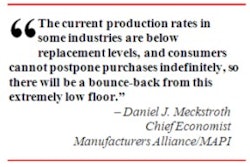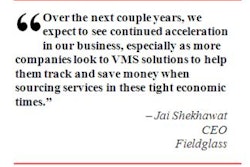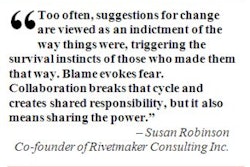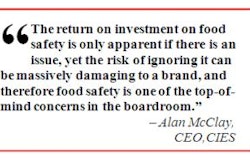What is an obedient third-party logistics (3PL) provider? It is one that doesn't share any responsibility for its customers' success and simply does what it is told. It keeps quiet when it knows the customers' request is misguided, and doesn't offer up new suggestions for re-thinking project goals.
When a company views its 3PL simply as a tactical service provider, you can be sure the relationship will not yield the kind of results either party expects.
Collaboration is key to avoiding obedience. The most successful relationships are ones where the customer realizes that outsourcing supply chain activities doesn't mean relinquishing itself from the responsibility of supply chain management. There is a delicate balance between managing the 3PL relationship and managing the services that are being offered. A 3PL must be given a certain amount of operational freedom to be successful. Tap into the 3PL's deep experience and actively solicit new suggestions for improving operational efficiency. Define shared accountability and key performance indicators (KPIs) to ensure that top-line goals are met, while giving the 3PL freedom to contribute new perspectives and ideas.
Daily management of the 3PL relationship is just as crucial to achieving desired performance results as getting the strategy right on paper and having a well-defined contract. In addition to establishing success metrics for your supply chain, you need to establish success criteria for your supply chain partnership. There needs to be flexibility on both sides, an understanding of challenges, and both parties have to own each other's problems. A supply chain partnership is only as strong as the skills and cooperation its participants bring to it.
So how can you prevent an obedient relationship with your 3PL?
When a company's goals are short-sighted and focused just around skimming the budget, the long-term goal of improving supply chain performance becomes more difficult to achieve. If a company is looking to harness the power of its supply chain as a competitive advantage, supply chain management needs to become part of an overall change management strategy. This means taking a holistic approach to improving productivity, not just cutting costs. There will always be tactical functions and cost pressures to be addressed. Yet for the most successful shippers, competitive differentiation comes when there is recognition of the value that can be achieved from strategic collaboration with a 3PL.
About the Author: Tom Jones is senior vice president for U.S. supply chains solutions at Ryder System, Inc. More information at www.ryder.com.
When a company views its 3PL simply as a tactical service provider, you can be sure the relationship will not yield the kind of results either party expects.
Collaboration is key to avoiding obedience. The most successful relationships are ones where the customer realizes that outsourcing supply chain activities doesn't mean relinquishing itself from the responsibility of supply chain management. There is a delicate balance between managing the 3PL relationship and managing the services that are being offered. A 3PL must be given a certain amount of operational freedom to be successful. Tap into the 3PL's deep experience and actively solicit new suggestions for improving operational efficiency. Define shared accountability and key performance indicators (KPIs) to ensure that top-line goals are met, while giving the 3PL freedom to contribute new perspectives and ideas.
Daily management of the 3PL relationship is just as crucial to achieving desired performance results as getting the strategy right on paper and having a well-defined contract. In addition to establishing success metrics for your supply chain, you need to establish success criteria for your supply chain partnership. There needs to be flexibility on both sides, an understanding of challenges, and both parties have to own each other's problems. A supply chain partnership is only as strong as the skills and cooperation its participants bring to it.
So how can you prevent an obedient relationship with your 3PL?
- Establish mutual interests and share goals. 3PLs need to have a vested interest in their customer's success and companies need to have a vested interest in their 3PL's success.
- Focus on performance rather than cost-cutting. 3PLs will always be able to deliver cost-cutting efficiencies; the best relationships also ensure higher levels of performance and customer service.
- Share more information than you normally would with a supplier. Include your logistics provider in upfront discussions about infrastructure, sourcing, IT and overall business strategies. The relationship must be open and honest. That means frank discussions about expectations, price and projected work levels. If you are not comfortable with this, you shouldn't outsource.
- Keep the relationship on track. This requires daily discussion. The relationship can't be evaluated once a year if it is to be successful.
When a company's goals are short-sighted and focused just around skimming the budget, the long-term goal of improving supply chain performance becomes more difficult to achieve. If a company is looking to harness the power of its supply chain as a competitive advantage, supply chain management needs to become part of an overall change management strategy. This means taking a holistic approach to improving productivity, not just cutting costs. There will always be tactical functions and cost pressures to be addressed. Yet for the most successful shippers, competitive differentiation comes when there is recognition of the value that can be achieved from strategic collaboration with a 3PL.
About the Author: Tom Jones is senior vice president for U.S. supply chains solutions at Ryder System, Inc. More information at www.ryder.com.












